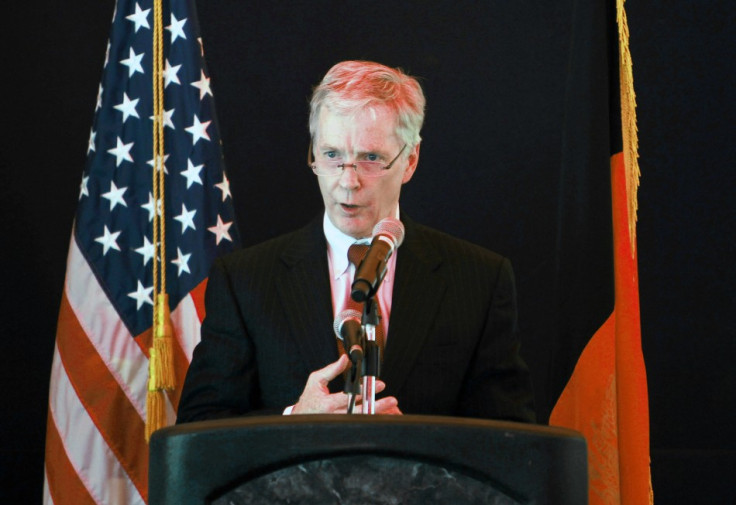Afghanistan: U.S Ambassador Crocker’s Speech, a Direct Hint to Iran Pakistan and China?

According to a new speech by U.S. Ambassador Ryan Crocker on Monday, the United States has no interest in creating permanent military bases in Afghanistan and does not want to use the country as a platform to influence neighbouring countries.
Crocker said that Washington is negotiating with the Afghan government on a deal that will define the long-term American role in Afghanistan beyond the end of 2014, when NATO-led combat troops are due to leave after handing security control to the Afghan army and police.
The "strategic partnership" agreement has recently sent tongues wagging as it is not known whether it would call for the establishment of U.S. military bases in Afghanistan beyond 2014. Afghan President Hamid Karzai has said the possibility of long-term U.S. bases can only be addressed once peace has been achieved.
However, following a string of high profile attacks directly targeting government officials from the Taliban, the future role of the U.S. in the country has left the public opinion divided. While many say the attacks confirm the need for foreign forces to keep being involved in the country to support the Karzai government, others say it will only further anger the Taliban.
However, putting rumours to an end, Crocker said, "We have no interest in permanent bases in Afghanistan," shortly after he was sworn in at the U.S. Embassy in Kabul.
"We will stay as long as we need to and not one day more."
The position the U.S. will take after 2014 has been the source of great interest in the region. Afghanistan has complex relationships with Pakistan and Iran, who see the country as vital to their own security and both countries fear the U.S. will try to undermine their influence there.
On the other hand, China and Russia have also indicated they remain wary of U.S. ambitions in the region.
The U.S. has had to face a number of setback in Afghanistan and despite billions being poured into building up the Afghan security forces; they still face important problems such as illiteracy or corruption.
As a consequence, both Afghans and foreigners expect some kind of continued military support beyond 2014, even if foreign troops are no longer on the front lines.
In the recent weeks, and following a rise in tensions between the U.S. and Pakistan, Washington has been accused of planning to keep bases in Afghanistan for attacks on targets in Pakistan's lawless tribal areas.
The area is believed to pose a terrorist threat, and the U.S. used such a base to launch the raid that killed al Qaeda head Osama bin Laden earlier this year, according to analysts.
Crocker however reiterated that the United States had no hidden agenda.
"We have no interest in using Afghanistan as a platform to project influence into neighbouring countries," he said.
"Our sole interest is in Afghanistan's security and sustainable stability and ensuring it will never again become a haven for international terrorism."
The Ambassador reopened the U.S. embassy in Kabul in 2002 and has also served as U.S. ambassador to Pakistan, Iraq, Syria, Kuwait and Lebanon. Ambassadors are normally sworn in by the Secretary of State in Washington, but Crocker chose to be sworn in by a junior Foreign Service member in Kabul.
He said that as Afghanistan gradually took control of its own security, it was important to remind Afghans that there would be no "rush for the exits" by the international community.
"Beyond 2014, even when Afghans have transitioned to a full security lead, I'm confident we and the international community will be in the position to work with Afghanistan to prevent any forcible return of the Taliban to power," he said.
"It's time for us to step back and for the Afghans to step forward," he said.
Though Crocker said Monday that progress has been made, he added that "we must proceed carefully .... Frankly, we left the wrong way in the 1990s and we all know the consequences of those decisions."
The Ambassador's speech then reveals a somehow mixed message. While it denies the possibility of permanent U.S. bases, it reaffirms that foreign involvement in Afghanistan will not stop in 2014. During his speech, Crocker also put an emphasis on the fact the international community will join the U.S. in its effort to support Afghanistan. While both the U.S. and Nato do not want to be burdened by having troops deployed in the country, given the geopolitical and strategically importance of Afghanistan, they will undoubtedly fight to preserve their influence in the country.
Also, The Ambassador's speech can be seen as a direct answer to Pakistan and Iran's fears. While becoming more demanding with Pakistan since the killing of Bin Laden in Abbottabad, the U.S. has however insisted cooperation between the two countries remained essential. A total breakdown from the U.S.-Pakistani relationship would come as a very bad news to the Obama administration has it would leave more space for closer Pakistan-Iran and Pakistan-China ties.
© Copyright IBTimes 2025. All rights reserved.





















